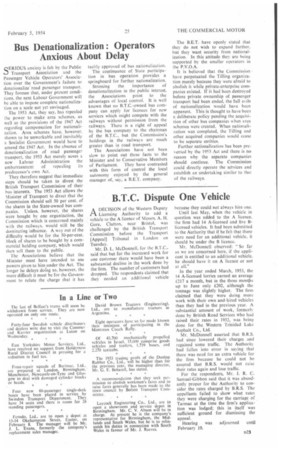B.T.C. Dispute One Vehicle
Page 63

If you've noticed an error in this article please click here to report it so we can fix it.
A DECISION of the Western Deputy 1-1. Licensing Authority to add a vehicle to the A licence of Messrs. A. H. Gore, Clutton, near Bristol, was challenged by the British Transport Commission before the Transport [Appeal] Tribunal in London on Tuesday.
Mr. D. L. McDonnell, for the B.T.C.. said that but for the increased work for one customer there would have been a substantial decline in the work done by the firm. The number of customers had dropped. The respondents claimed that they needed an additional vehicle
because they could not always hire one.
Until last May, when the vehicle in question was added to the A licence. the firm had 14 A-licensed and five Blicensed vehicles. It had been submitted to the Authority that if he felt that there were need for an additional vehicle, it should be under the B licence.
Mr. McDonnell observed: -So far as we are concerned here, if the applicant is entitled to an additional vehicle, he should have it on A licence or not at all."
In the year ended March, 1953, the 14 A-licensed lorries earned an average £217 a month, but in the three months up to June only £202, although the tonnage was slightly higher. The firm claimed that they were doing more work with their own and. hired vehicles than they had in the previous year. A substantial amount of work, formerly done by British Road Services who had raised their rates in 1952, was being done for the Western Trinidad Lake Asphalt Co., Ltd.
Mr. McDonnell asserted that B.R.S. had since lowered their charges and regained some traffic. The Authority had fallen into error in saying that there was need for an extra vehicle for the firm because he could not be assured that B.R.S. would not raise their rates again and lose traffic.
For the respondents, Mr. J. R. C. Samuel-Gibbon said that it was abundantly proper for the Authority to consider the rates charged by B.R.S. The appellants failed to show what rates they were charging for the carriage of Tarmac at the time the firm's application was lodged; this in itself was sufficient ground for dismissing the appeal.
Hearing was adjourned until February 10.








































































































